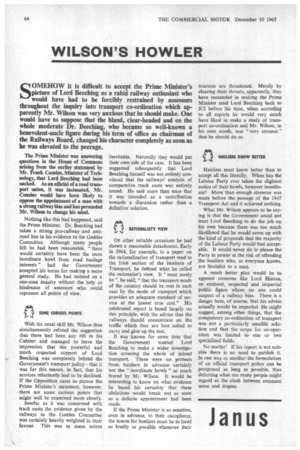WILSON'S HOWLER
Page 66

If you've noticed an error in this article please click here to report it so we can fix it.
SOMEHOW it is difficult to accept the Prime Minister's picture of Lord Beeching as a rabid railway enthusiast who would have had to be forcibly restrained by assessors throughout the inquiry into transport co-ordination which apparently Mr. Wilson was very anxious that he should make. One would have to suppose that the bland, clear-headed and on the whole moderate Dr. Beeching, who became so well-known a benevolent-uncle figure during his term of office as chairman of the Railways Board, changed his character completely as soon as he was elevated to the peerage.
The Prime Minister was answering questions in the House of Commons arising from the earlier statement by Mr. Frank Cousins, Minister of Technology, that Lord Beeching had been sacked. As an official of a road transport union, it was insinuated, Mr. Cousins would have been likely to oppose the appointment of a man with a strong railway bias and has persuaded Mr. Wilson to change his mind.
Nothing like this had happened, said the Prime Minister. Dr. Beeching had taken a strong pro-railway and antiroad line in his evidence to the Geddes Committee. Although many people felt he had been reasonable, "there would certainly have been the most inordinate howl from road haulage interests" had the Government accepted his terms for making a more general study. He had insisted on a one-man inquiry without the help or hindrance of assessors who could represent all points of view.
SOME CURIOUS POINTS
With his usual skill Mr. Wilson thus simultaneously refuted the suggestion that there had been any rift in his Cabinet and managed to leave the impression that the powerful and much respected support of Lord Beeching was completely behind the Government's transport policy—that it was for this reason, in fact, that his services reluctantly had to be declined. If the Opposition cares to pursue the Prime Minister's statement, however, .there are some curious points that might well be examined more closely.
Insofar as it was concerned with track costs the evidence given by the railways to the Geddes Committee was certainly heavily weighted in their favour. This was to some extent inevitable. Naturally they would put their own side of the case. It has been suggested subsequently that Lord Beeching himself was not entirely convinced that the railways' analysis of comparative track costs was entirely sound. He said more than once that it was intended as a contribution towards a discussion rather than a definitive solution.
RATIONALIST'S VIEW
On other suitable occasions he had shown a reasonable detachment. Early in 1964, for example, in a paper on the rationalization of transport read to the Irish section of the Institute of Transport, he defined what he called the rationalist's view. It "must surely be ", he said, "that the transport needs of the country should be met in each case by the mode of transport which provides an adequate standard of service at the lowest true cost." His celebrated report is based largely on this principle, with the advice that the railways should concentrate on the traffic which they are best suited to carry and give up the rest.
It was known for some time that the Government wanted Lord Beeching to make a wider investigation covering the whole of inland transport. There were no protests from hauliers in advance certainly not the "inordinate howls" so much feared by Mr. Wilson. It would be interesting to know on what evidence he based his certainty that these ululations would break out as soon as a definite appointment had been made.
If the Prime Minister is so sensitive, even in advance, to their cacophony, the lesson for hauliers must be to howl as loudly as possible whenever their interests are threatened. Merely by clearing their throats, apparently, they have succeeded in making the Prime Minister send Lord Beeching back to ICI before his time, when according to all reports he would very much have liked to make a study of transport co-ordination and Mr. Wilson, in his own words, was "very anxious" that he should do so,
HAULIERS KNOW BETTER
Hauliers must know better than to accept all this literally. When has the Labour Party ever taken the slightest notice of their howls, however inordinate? More than enough clamour was made before the passage of the 1947 Transport Act and it achieved nothing.
What Mr. Wilson appears to be saying is that the Government could not trust Lord Beeching to do the job on his own because there was too much likelihood that he would come up with the kind of proposals that the majority of the Labour Party would find acceptable. It would never do to please the Party in power at the risk of offending the hauliers who, as everyone knows, are Socialist to a man.
A much better plan would be to appoint someone like Lord Hinton, an eminent, respected and impartial public figure whom no one could suspect of a railway bias. There is a danger here, of course, that his advice actually would be impartial. He might suggest, among other things, that the compulsory co-ordination of transport was not a particularly sensible solution and that the scope for co-operation was limited to one or two specialized fields.
No matter! If his report is not suitable there is no need to publish it. In one way or another the formulation of an official transport policy can be postponed as long as possible, thus deferring what too many people might regard as the clash between common sense and dogma.




























































































































